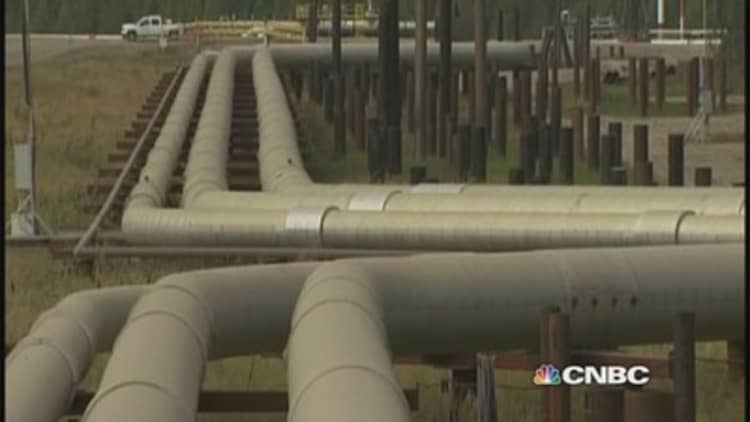Looking beyond the controversies surrounding the Alberta oil sands and the Keystone XL pipeline, more than 70 leading figures from the Canadian energy sector gathered for CNBC's EnergyFuture brainstorm in Toronto Wednesday to tackle how to break in to Asia.
Responding to host Geoff Cutmore's provocation that Canada has serious questions to ask itself, brainstorm participants were asked how Canada could become the leading exporter of energy and environmental technology to Asia within 20 years. Though the participants were free to imagine any possibility, the participants called for: a national energy policy, a price on carbon, and clean electrification of the nation's economy.
Read More What makes Canada's oil sands worth the trouble?
The winning solution, presented on behalf of his table by Bruce Lourie, president of the Ivey Foundation, focused on electrification. Aided by flexible smart grids, and improved management of demand through better use of big data, Canada needed to double down on its already extensive use of renewable energy in the grid.
"We have the lowest carbon footprint in electricity of any jurisdiction in the world," Lourie said. "So how do we build on that? We optimise electrification of the economy, and that means looking at end uses."
David Runnalls, senior fellow at Sustainable Prosperity, said that the best method to build incentive and drive innovation was the obvious one - taxation.
Read MoreThe Keystone pipeline: Key questions

"If you go to the OECD(Organisation for Economic Cooperation and Development)," he told the room, "they will tell you that the best functioning carbon tax in the world is in British Columbia, which has reduced gasoline consumption by 18 per cent per capita over four years. It's politically acceptable, it's been through two elections, it's now a non-partisan issue. We know how to do this in Canada. It didn't kill jobs, it didn't produce declining rates of growth. We actually do know how to do a world-class carbon tax here."
Jacob Irving, president of the Canadian Hydropower Association, told CNBC that it became clear during the brainstorm that this idea was enthusiastically embraced across energy sectors.
"What I heard commonly from every table, expressed differently, was that a carbon tax is something that would help us," he said.
"It would improve our current petroleum offering to the world by helping us to invest in carbon capture and sequestration, it would help the petroleum industry have a better social license, and meet its customer demands."
Read MoreHow tech is moving oil sands industry forward
For the table represented by Bill Robson, president and CEO of the CD Howe Institute, energy export and management could take more subtle forms, trading on Canadian expertise.
"You sell energy in packaged form," he told CNBC. "Sometimes this is in forms that are hard to recognise, including high-end professional services for people who are using transport, living in heated houses, energy exports in a lot of ways, some obvious, some subtle."
Scott Nelson, CEO of Titanium Corporation Inc, presented his table's vision to assist China reduce its coal consumption by 50 per cent through provision of alternative, lower carbon fossil fuels, and through technology including carbon capture and storage. Coal, he said, is an older energy. "We can help reduce it but we have to replace it." To do this, however, Canada would have to work on its image as a leader in clean energy.
"We have not a great reputation that we have to improve on," Nelson told CNBC. "The [oil sands] resource is large, it's going to be used for decades, so we need to green it. If we can prove to Canadians that we can do this in an environmentally responsible way, then the markets will say, that's fine, we'll buy it. And then we transition to other technologies for our children and our grandchildren."
Follow us on Twitter: @CNBCWorld




